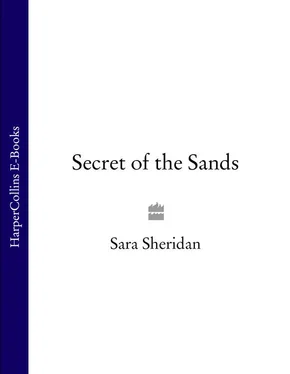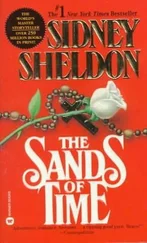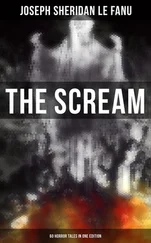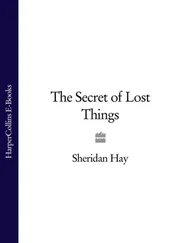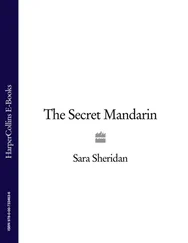As he strides out, he ignores the stares a white man in naval uniform necessarily excites on the crowded streets of the capital. He ignores too the pressing heat of his well-tailored jacket as he passes through the stripes of sunshine and shade. He is not under orders but that matters little to him – he simply wants to know what has happened, not only for Jessop and Jones’ sakes, but also because it’s important to build up his knowledge of the Peninsula and how things work here. In fact, if he is to make his name, it is vital. By hook or by crook. Whatever it takes.
The agent’s office is a modest, whitewashed, two-storey house a little way up the hill and beyond the frantic press of streets that make up the dockside district. The man’s name is Ali Ibn Mudar and he has served the interests of the Indian Navy for the best part of twenty years, for which he receives a hefty retainer in addition to the proceeds of the thriving business he runs as a trader in textiles, particularly silks. These two activities dovetail well and Ibn Mudar’s ships often obtain preferential treatment when they come into contact with Indian Navy vessels. Ibn Mudar speaks perfect English. He has, it is rumoured, a European wife, captured from a shipwreck some years before and bought at an astronomical price for his harim . This lady has never been seen in public and no one knows if the rumours are true, but if it is she who has tutored Ibn Mudar in what can only be assumed is her native tongue, she has done a good job; he speaks English, somewhat comically though, with a heavy Irish accent. For this reason he is known in Bombay, exclusively behind his back, as Mickey Ibn Mudar or Our Dear Mickey. That notwithstanding, the agent is considered well-connected, helpful and courteous, and although Wellsted has never met him before, he has high hopes as he knocks on the sun-bleached front door and waits.
Inside, he is shown into a cool, tiled courtyard by a young slave boy in a robe as yellow as a canary, his eyelashes so long that they could dust the ceilings of their cobwebs. The boy offers Wellsted a copper bowl of cool water and rose petals in which to make his ablutions. He does so noticing how much better he feels only a little way out of the oppressive heat. Then, courteously, the slave ushers him upstairs and Ibn Mudar welcomes the young lieutenant into his office on the first floor. The slatted wooden shutters keep the room shady and warmed by the sun, and also give out a pleasant aroma of sandalwood. Between the slats and cut-out stars there are glimpses of an impressive view over the bay. To one side there is a large, cedarwood desk with scrolls of accounts and ledgers stored behind it on a series of intricately carved, wooden shelves and burr cubby holes. On the other side there is a comfortable seating area with low, embroidered cushions and goatskin throws. This is not the agent’s home, however. That is far grander and much higher up the hill. He prefers to keep his working life separate, always has.
As the man smiles and rises to greet his visitor, Wellsted quickly notes that Ibn Mudar’s plain jubbah is made of very fine cotton – curiously unshowy given that the main part of his income comes from a textile business. The lieutenant considers mentioning his own family’s background in the same trade but deems it inappropriate. Instead, he sizes up the Navy’s agent silently. Ibn Mudar, with a greying beard, in his mid-fifties, is only slightly overweight and his eyes seem to take in everything and give nothing away. He clears his throat to make his salaams , but he does not invoke Allah. The custom in this office is the same as it would be in Liverpool or Southampton so the Navy’s representative reaches out to shake Wellsted firmly by the hand and smiles.
‘How do you do? I was to send to the ship shortly, you know. Would you partake of a coffee, Lieutenant?’
Wellsted does not laugh, though not to do so is an effort. The man’s accent is as thick as treacle. He might as well be from Cork. ‘Thank you. I would enjoy a coffee.’
The agent waves a hand and his slave disappears to fetch what is needed as the men sit down together on the pile of cushions on the floor. Wellsted likes him immediately. There is something cut and dried about this man and competent too. Our Dear Mickey feels like an apt moniker.
‘You have come for your letter from London, have you?’ Mickey says.
Wellsted starts. He has, in his whole time in the service, never received a personal letter. It is an amazement that such an item has found him here.
‘From London?’ he repeats, the shock showing in his voice.
His heart races with the realisation that this could be a momentous turn of events – is it possible that Murray has already responded to his manuscript? Surely it will take longer than this, but then who knows the ways of the famous publisher? It has, he counts the weeks, probably been long enough. With surprise, he notes that his palm feels suddenly sticky and his stomach flutters nervously.
Mickey reaches into a large, burnished box beside his cushion and passes a folded envelope franked in Mayfair. Wellsted breaks the small, red seal. Inside, the handwriting is haphazard – not what he would expect from a man of Murray’s education and renown. Wellsted takes a deep breath, comprehending that this missive is even more momentous than one that might contain John Murray’s comments on his account of the Socotra trip. This letter has emanated from his family home in Molyneux Street and is dated in May – two months ago.
Dear Brother,
I regret to inform you that after some months of suffering our grandfather has died. We buried him at the parish church a week past. Apart from this sad news all is well here. Edward has taken the oath to be a customs man at Greenwich. Please when you write now, address yourself to our father .
Most sincerely,
Your brother,
Thomas Wellsted Jnr
James turns the paper over. It seems unnecessarily brief. He remembers young Thomas as an infant only just out of his nappies and rosy-cheeked, learning to climb out of the cot – a child as he had been in the year James Wellsted left home. For a moment James indulges himself, wondering what the boy looks like now or if, indeed, there might be more infants that followed his departure and he has nameless brothers and sisters growing up in his parents’ home. A Charles perhaps. Even an Emily or Elizabeth.
Mickey allows a pause long enough for Wellsted to take in his news, whatever it may be. ‘All is well in London, I hope,’ the agent says gently.
‘News of home, that is all,’ Wellsted dismisses the letter briskly, pushing it into his pocket. He has no time for personal matters or at least he never makes any. ‘I did not come for the letter,’ he admits. ‘I am here on another more serious matter. We have two officers gone missing in the interior. They were led across the jabel and into the desert by Dhofari guides to visit the Bedu several weeks ago. Dr Jessop who was our ship’s surgeon and First Lieutenant Jones. They missed their rendezvous and have not been heard of since. We docked at every decent-sized port along the coast but have found out very little, though outside Aden I encountered a group of Bedu . I heard the men were prisoners of the emir – that they had offended him in some way and were being held in his caravan. The description the Bedu gave was consistent with the appearance of the men though the captain – Captain Haines, that is – believes them dead. When we made rendezvous with the Benares however, Captain Moresby was of the view that we must be sure.’
Mickey scratches his cheek with a long, carefully manicured finger, which sports a thick ring of yellow gold with a red stone embedded on the face. He takes a sip of his strong coffee.
Читать дальше
